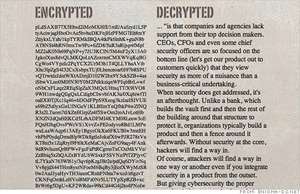
That's what a father and son team from Calgary, Alberta, say they've created. For the past several years, cryptographic hobbyists Robert and Frederik Kleiner have been working to develop Enigma-DS http://enigma-ds.net/ , an encryption code that they claim cannot be broken.
Rather than encrypt a bit of text letter by letter (A becomes Q, B becomes H, etc.), Enigma-DS converts text into code based on language, sentence structure and words. For example, the word “rose” could become “wp76546hj!lldrk,” but “rise” might become “aq!@#Qh!21mb.”
A unique key is generated for every encoded item. Even if someone were able to discover the key to unlock and decrypt one file, others would remain unaffected by the breach, the Kleiners say.
They're so sure of their code's security that the Kleiners ran a contest this summer offering $100,000 to anyone who could crack it. No one broke the code during the two months that the little-publicized competition ran.
They even challenged the National Security Agency to break it, which declined to comment beyond saying the agency welcomes such submissions.
If you're skeptical, so are cryptography and cybersecurity experts. Encryption, they say, is not the weakest link in the security chain. People are.
Security professionals already use cryptography that, for all intents and purposes, cannot be cracked. Tools like one-time pads , which generate new code-unlocking keys for each encryption, or encryption methods like the Advanced Encryption Standard http://en.wikipedia.org/wiki/Advanced_Encryption_Standard (AES) are so complex that they could not be broken by modern supercomputers http://en.wikipedia.org/wiki/One-time_pad in our lifetime. http://money.cnn.com/galleries/2011/technology/1106/gallery.fastest_supercomputer/index.html?iid=EL
But human beings, unfortunately, just aren't that dependable.
“The problem isn't encryption, the problem is people using weak passwords or the same passwords on 100 different places,” said Chuck Easttom, a cybersecurity trainer at EC-Council's Center of Advanced Security Training. “The past six months have been replete with hacking stories, and not one has been because an encryption was broken.”




 Former Kotoko Player George Asare elected SRC President at PUG Law Faculty
Former Kotoko Player George Asare elected SRC President at PUG Law Faculty
 2024 elections: Consider ‘dumsor’ when casting your votes; NPP deserves less — P...
2024 elections: Consider ‘dumsor’ when casting your votes; NPP deserves less — P...
 You have no grounds to call Mahama incompetent; you’ve failed — Prof. Marfo blas...
You have no grounds to call Mahama incompetent; you’ve failed — Prof. Marfo blas...
 2024 elections: NPP creates better policies for people like us; we’ll vote for B...
2024 elections: NPP creates better policies for people like us; we’ll vote for B...
 Don’t exchange your life for wealth; a sparkle of fire can be your end — Gender ...
Don’t exchange your life for wealth; a sparkle of fire can be your end — Gender ...
 Ghana’s newly installed Poland train reportedly involved in accident while on a ...
Ghana’s newly installed Poland train reportedly involved in accident while on a ...
 Chieftaincy disputes: Government imposes 4pm to 7am curfew on Sampa township
Chieftaincy disputes: Government imposes 4pm to 7am curfew on Sampa township
 Franklin Cudjoe fumes at unaccountable wasteful executive living large at the ex...
Franklin Cudjoe fumes at unaccountable wasteful executive living large at the ex...
 I'll 'stoop too low' for votes; I'm never moved by your propaganda — Oquaye Jnr ...
I'll 'stoop too low' for votes; I'm never moved by your propaganda — Oquaye Jnr ...
 Kumasi Thermal Plant commissioning: I pray God opens the eyes of leaders who don...
Kumasi Thermal Plant commissioning: I pray God opens the eyes of leaders who don...
